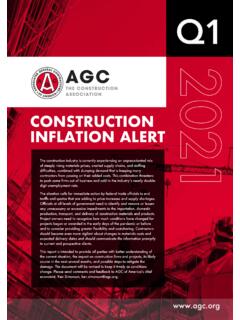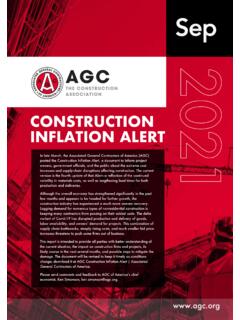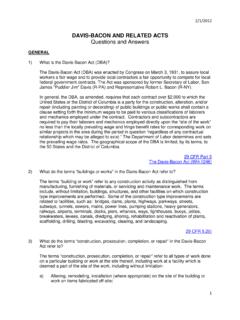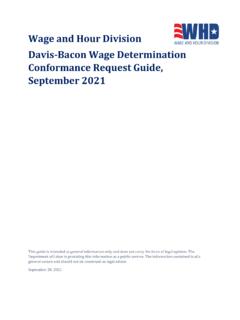Transcription of Overview of $1.2 Trillion Bipartisan Infrastructure Bill ...
1 Updated October 21, 2021 AGC of America SUPPORTS the $ Trillion Bipartisan Infrastructure Bill Please also check out our Myth vs. Fact Summary Overview of $ Trillion Bipartisan Infrastructure Bill ( Infrastructure Investment & Jobs Act) THE BILL S PROS THE BILL S CONS Provides Record-Setting Investment in Physical Infrastructure Unlike the Human Infrastructure bill, this bill focuses on investment in building and maintaining America s physical Infrastructure including: $66B for freight and passenger rail; $65B to states for broadband deployment and broadband affordability; $55B for water Infrastructure ; $47B for roads and bridges (in addition to the reauthorization); $73B for modernizing electric grid and clean energy transmission; $39B for transit; $25B for airport projects; and $17B for ports. Fails to Address the Long-Term Solvency of the Highway Trust Fund The bill continues to rely on an assortment of pay-fors since the motor fuel taxes have not been increased since 1993 and were not indexed to inflation.
2 In addition, the growing number of electric and alternative fuel vehicles are reducing revenues into the Highway Trust Fund which has further exacerbated the problem. However, AGC is encouraged by the inclusion of a pilot program to demonstrate a national motor vehicle per-mile user fee. The voluntary national pilot will share insights on this vehicle per-mile user fee, that will help facilitate the possible transition away from motor fuel taxes which will eventually become unsustainable as more Americans transition to electric cars. This pilot will help answer questions about how a tax could be collected, how to ensure that rural residents don t get forced into unfairly paying more and other unanswered questions. Includes the Surface Transportation Reauthorization Act The bill includes the AGC-supported Senate Environment and Public Works Committee s 5-year Surface Transportation Reauthorization Act.
3 This bill makes a $304B investment in roads and bridges, $85B more than the FAST Act. A state-by-state breakdown of funding can be found here. Expands Buy America Requirements to Include Construction Materials The bill adds construction materials to the Buy America requirements for federally funded projects. The bill creates exemptions for cement; asphalt; aggregates like stone, sand and gravel; and aggregate binding agents or additives as inputs of construction materials. AGC has concerns about potential unintended consequences of this policy but supports the exemptions. Does NOT Increase Taxes on Construction Companies Unlike prior proposals, like the Biden American Jobs Plan, this bill does not increase the corporate tax rate. It also does not include increases to individual tax rates or capital gains rates, like the Biden American Families Plan. Cancels Q4 2021 Employee Retention Tax Credit (ERTC) The bill would end the ERTC one quarter early, making wages paid after September 30, 2021, ineligible for the credit (except for wages paid by an eligible startup business).
4 Does NOT Include AGC-Opposed PRO Act or Gov t-Mandated PLAs Unlike other proposals, this bill does not tie historic Infrastructure investment to the PRO Act (any of its provisions) or government-mandated PLAs. Expands Davis bacon Beyond the Status Quo Construction Markets Requires that all energy related work be paid at the prevailing wage rate. This is an expansion of the Davis bacon requirements into a new market. AGC opposes the expansion of Davis bacon requirements beyond the status quo and advocates for sensible Davis bacon reforms. Expedites the Project Approval Process Makes the Trump environmental One Federal Decision policy permanent law that will help hold agencies accountable by requiring timelines and page limits on large environmental documents. It makes other improvements by allowing utility relocation prior to the environmental reviews being complete. Allows for Local Hire Requirements, But Does Not Require Them The bill allows grant recipients discretion to implement a local or economic hiring preference relating to the use of labor on a grant-funded construction project, subject to any applicable state/local laws, policies, and procedures.
5 This, however, does not alter the status quo. Allows States to Build New Roads Without New Restrictions Does not include restrictions on or excludes eligibilities for expanding highway capacity like was included in the House INVEST Act. AGC of America was opposed to this provision and led a coalition effort in opposition to it. Gives Broad Discretion to Federal Agencies Provides some funds to federal agencies for distribution by discretionary grants. This provides agencies an opportunity to add new requirements, some of which could go beyond the scope of congressional intent. Updated October 21, 2021 AGC of America SUPPORTS the $ Trillion Bipartisan Infrastructure Bill Please also check out our Myth vs. Fact Summary Invests in America s Energy Infrastructure Invests over $100B in our nation s energy Infrastructure by including the Bipartisan Energy Infrastructure Act. This makes critical investments to provide resiliency for our energy grid, energy efficiency in buildings, and investment in our water Infrastructure .
6 Invests in Water Infrastructure Includes over $50B in investment in our nation s water Infrastructure including the Drinking Water State Revolving Funds, Clean Water State Revolving Funds, and the Water Infrastructure Finance and Innovation Program (WIFIA). These programs are instrumental in providing low-cost and accelerated financing on a wide range of water Infrastructure projects. Substantial Investments in Direct Federal Construction Provides $ to the Army Corps of Engineers for construction, $4B for operations and maintenance, and more than $800 M for MR&T. Provides $ to Bureau of Reclamation for water Infrastructure projects and grants. Provides General Services Administration and Customs and Border Protection more than $740M for land ports of entry and border station Infrastructure . Provides the Natural Resources Conservation Service more than $800M for water and flood control operations.
7 Expands Opportunities for Young Truck Drivers Establishes an apprenticeship program in order to allow for the legal operation of a commercial motor vehicles in interstate commerce by commercial driver s license (CDL) holders under the age of 21. Currently, most states allow individuals to obtain a CDL at age 18, but federal law prohibits drivers from moving goods across state lines until they are 21 years old.
















